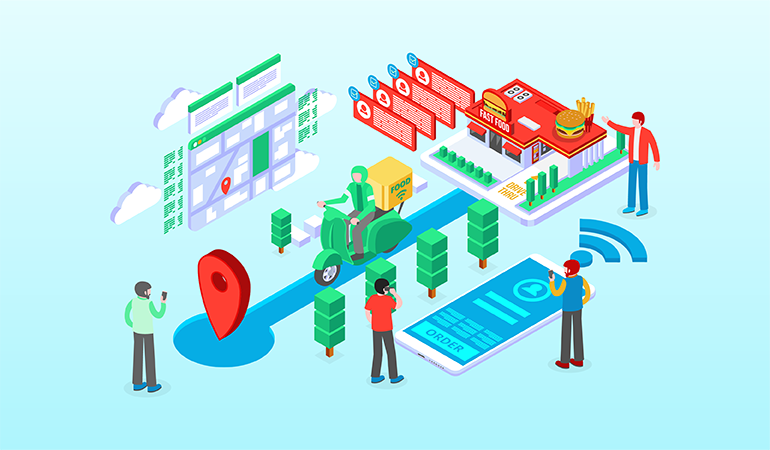With rising competition and ever-growing technology, the food space has been prone to many unpredictable changes for quite some time. The growing demand for online food deliveries, high real estate costs, and thinning margins have led to the birth of delivery-only restaurants and cloud kitchens. Also known as the dark kitchen, ghost kitchen, and virtual kitchen, the cloud kitchen is gaining popularity in the F&B world.
Cloud Kitchens are delivery-only restaurants that have no physical space to dine in. It entirely depends upon online orders placed through online aggregators or a website or mobile app. There have been restaurateurs raving over the cloud kitchen concept and figuring out its intricacies. So much so, they consider cloud kitchen as the smarter way to run business in the future .

As per a report by Goldstein Research, the global cloud kitchen market was valued at 700million USD in 2018 and is expected to grow at a CAGR of 17.25% through a forecast period (2017 -2030) .
Cloud kitchens are better suited to the demands of socially distanced customers than the traditional dine-outs at restaurants. They are also able to minimize some costs, such as rent and extra staff and fewer people are required on the payroll.
With the Coronavirus pandemic keeping restaurants shut for a very long period of time giving a booming rise to take-away meals in India. This hints that the shift towards home-delivery foods is here to stay.
Cloud kitchen facilities having no physical dining space and catering only to deliver orders online is expected to become a $2 billion industry in India by 2024, according to RedSeer Management Consulting. That’s up from $400 million in 2019. As surveyed by the company, 21% of the respondents said that they intended to increase their online ordering of the takeaway foods post-lockdown while only 9% said that they wished to visit restaurants more often.
We are well aware of how blockchain helps businesses grow with less time-consuming money transfer and transparent and traceability features of banking. The idea of time is money is what blockchain technology stresses. The fact that fresh, warm food is worth the money is also undeniable. The increased importance of cloud kitchens also increases expectations of quick delivery of foods to the customers, this is where blockchain comes to the rescue. Blockchain technology working together with a cloud kitchen aims to provide the customers with on-time and traceable food delivery services.
“ Food traceability is already being developed via blockchain . While much of what is currently thought of as blockchain is for transaction and cryptocurrency, it is much more than that “
IBM Food Trust Paul Chang said during a presentation at the National Restaurant Association Show.
One of the possible sources of transparency is the blockchain. This innovative technology could give manufacturers, distributors, restaurants, and retailers a single source of truth about every delivery that passes through the incredibly complex food supply chain. Blockchain technology may help the cloud kitchens to rebuild and reinforce the lost trust from the general public acting as a “certificate of excellence” that consumers could rely on when choosing products off the shelf.

Lays emphasis on traceability: Producers, retailers, distributors, and eateries most often must have blind trust in one another while operating the supply chain. For example, instead of conducting time-consuming background checks on the shipped product, the retailers will choose to trust the quality assurance processes of the suppliers. Although this simplifies the supply chain when a crisis occurs it is difficult to trace where the contamination has occurred. Thus tracing any product batch through the entire supply chain is in the best interest of every participant.
Blockchain can do this by creating a record of every such batch as the product travels from field to factory to supermarket to fridge the data gets automatically updated and cannot be edited without the permission of every party in the supply chain. This creates a trail that improves track and trace capabilities through the supply chain potentially allowing batches with issues to be identified and isolated within hours instead of weeks.
Customers want greater transparency: Blockchain could also help the food industry in giving the consumers what they want. We are already aware of the fact that the existence of a blockchain system will dramatically raise the attention given to food security and integrity. Operators are less likely to cut corners if they know their efforts are evident to each partner in the chain. Making the food supply chain more transparent allows businesses to better adhere to today’s ever-tightening food safety regulations.
Further, this level of clarity will help answer consumers’ growing questions regarding where the food comes and travels from. Consumers are increasingly concerned about the authenticity and safety of their food sources. Food companies and supply chains that can provide more honest information on how the food is grown, picked, processed, and delivered as per the supply chain will be in a better position in providing the consumers the right kind of assurance that they desire.
It is just the beginning of blockchain technology to set its roots deeper into our system. Yet it holds greater potential to revolutionize the supply chain of the F&B industry. If used correctly, it could help decipher today’s complex and sprawling food supply chains making it easier to ensure the security and safety of food that we consume.